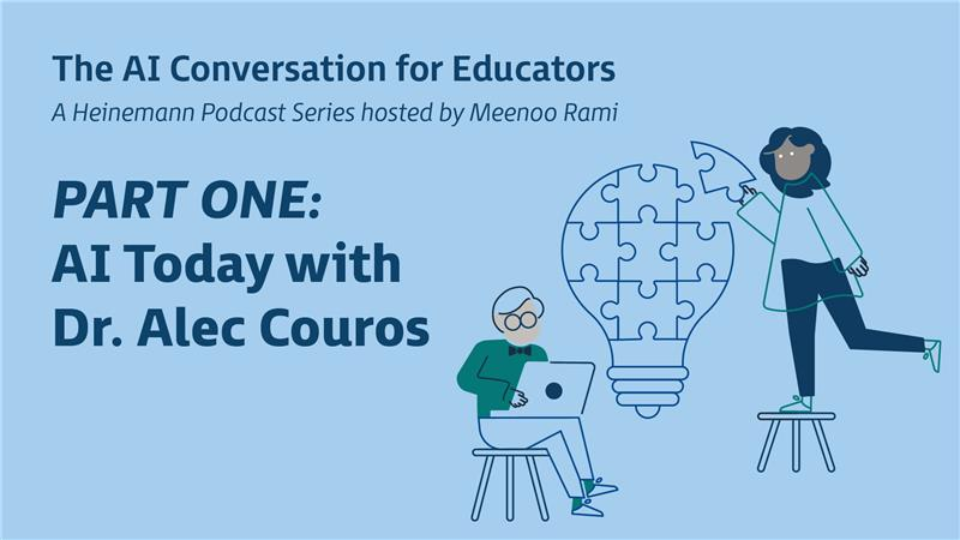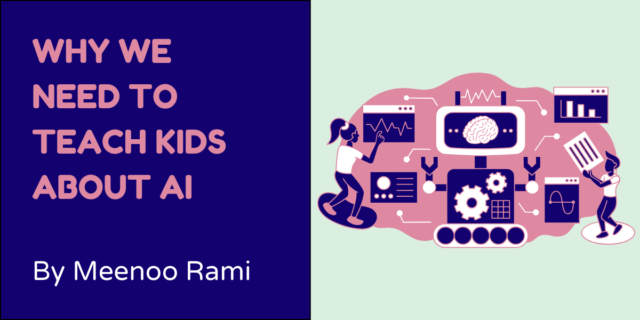
Welcome to The AI Conversation for Educators, A Heinemann Podcast Series hosted by Meenoo Rami.
This series for teachers explores how generative AI is transforming teaching and learning.
In this episode, Meenoo Rami speaks with Dr. Alec Couros, a leading expert in educational technology and media. Dr. Couros is a professor at the University of Regina and director of the Center for Teaching and Learning.
Together, they discuss:
- Why AI literacy for educators is essential
- How generative AI tools are reshaping student learning and teacher workflows
- What it means to foster creativity and critical thinking in an AI-driven world
Transcript
Dr. Alec Couros:
Yeah, sure. I mean, that's a really important piece, and it's important to understand that there are different kinds of AI, and AI have been around a long time. When I look outside my window here, I can see the Saskatchewan prairie, and I think about predictive AI have been used in crop cycles. I mean, farmers use it to understand how to cultivate, or how to seed their land. We use it on a general basis in Google, whenever Google or a search engine looks for the most relevant resources for particular search. That's always been around for a long time. But what we're typically talking about when we think about AI is generative AI. So something that from a text prompt creates something new, and teachers of course are using it to create lesson plans. At the same instance, we're seeing students do their assignments on it.
And so it's interesting. I mean, that's just the text-based one, but of course there's plenty of examples of people using it to develop images. Popular tools like Midjourney or even ChatGPT, or OpenAI use something called DALL-E. As of a few days ago, there's a native text image generator right in ChatGPT. Of course, there are a number of tools that develop videos, which of course makes information literacy that much harder, especially during election cycles. We have an election, you had the recent one in the U.S., and we have a upcoming one in Canada right away in April of 2025.
And the ability to create really compelling and convincing video of anyone in any situation whether that's in a political environment, whether that's a historical environment, whether it's a high school environment where kids are bullying each other, this brings a lot of new challenges to the context. It's a really amazing technology, but it is absolutely going to have huge implications on education and society, and we have to understand it at a much better level than what we're dealing with now. And I would suggest in the last little while, I've never had so many queries on any technology before this, and it's just really interesting that everyone is interested at every level.
Meenoo Rami:
And I love the way that you frame that, that there's so much potential for positive use cases, but there are so many challenges that come along with this new technology. And like you, like me, and those who are listening, everyone's grappling with it, trying to figure it out, and trying to really find that balancing act in their personal and professional lives.
You mentioned some of the concerns. What do you think are some of the most common misconceptions you've encountered regarding AI and education?
Alec:
I'm still hearing examples of ChatGPT can't do opinion papers. So teachers have been putting into their assignments like, "Give me an example of what we're talking in class, and provide your opinion about those things." And somehow teachers may think that these are AI proof assessments when they're at best AI resistant. But really I find that AI gets to know me, gets to know the way I write, the context of which I work, and after a while, their opinions are as good as mine in terms of the accuracy, probably written better. So that initial truth where AI wasn't good at developing opinions and it was mostly based on factual and objective content is not true anymore.
And the same goes for other misunderstandings. ChatGPT can't do citations. It's been quite a while now where you had ChatGPT able to do citations, but then you also have Perplexity which does citations very well. So in terms of what it can possibly do, I think that is the biggest thing. Because I think for most people thought that there are some really grave and simple limitations of the AI that it couldn't possibly match human thought, or even the creative flow.
Meenoo:
I think that's an important thing to point out. It's often said in these circles that this is the worst version of AI that we will have access to. So that there is that constant, not only a need, but an utmost responsibility to know what tools are capable of. And they're constantly evolving. It's not easy even if you try to stay completely on top of it. It's a lot of work to know what new tools are, in what ways their capabilities are evolving and changing.
Alec:
I understand that teachers don't have the time to subscribe to every newsletter, but there needs to be someone in the school or in educational environment, in business, and to keep us up on the latest possibilities. Many teachers for a while said, "I can spot AI writing." But when you actually test that, they cannot necessarily, right. Sometimes it's obvious. If you know a student's writing and all of a sudden it changes from this to that and the tone changes, and they're incredibly great citations, and they've mastered all these other types of things, of course you're going to tell. But in terms of AI detectors, those are out. They're not reliable and they are-
Meenoo:
Not accurate.
Alec:
... They're not accurate at all. And many universities have basically said, "We're not going to use this for one, they don't work. And two, even if they did work, they don't give us any insight as to how they did it." And so if students appeal an academic misconduct charge, what evidence does the institution really have other than a tool told us that this is the case?
Meenoo:
And there might be bias built into those detectors as well.
Alec:
Oh, yeah. Certainly is. Yeah, and as you know, I'm sure those who are non-English speakers, those particular tools detect those disproportionately to other native English speakers in terms of their language. So there's certainly bias and prejudice in the results that we obviously have to be very cautious to not re-marginalize those marginalized communities and again, re-oppress students in those particular cases who are already vulnerable in the education system.
Meenoo:
One of the reasons why I wanted to start this series with you is I've known you for a long time. I've considered you a mentor for a long time, but I've also considered you somebody who thinks about EdTech, and these movements, and these moments. How do you think about this AI moment as being similar to other things like Web 2.0, and other times that we've experienced together? And what's unique about this moment? How do you think about that?
Alec:
So we went from access to knowledge with the internet. We went to the sharing and contribution of knowledge through Web 2.0. But this is not just knowledge. What's different about this is, this is your sharing intelligence. And now there's caveats around, I want to put an asterisk by intelligence because AI isn't necessarily intelligence. It's like it's a parrot with a generative engine of some sort. There's a parroting of everything we've known. But this intelligence portion, not just content that just lays there waiting to be manipulated, but this also does the manipulation for you. So it can take some of the things that teachers are doing really well in the classroom is they're using it for content leveling, or being able to take this content and explain it to my seventh grader or someone who's reading at a fifth grade level. And that was very difficult to do before, and that requires intelligence. And so being able to tap into new forms of intelligence and being able to do that in a classroom is incredibly valuable.
Meenoo:
Two things stuck out to me. One, some of the new to this career path, teachers who are maybe of a younger generation might not even recognize some of the tools that you mentioned have come and gone. And then the second thing is the really salient point that you made about how these very powerful technologies are not devoid of values. They have values built into them, and how they're going to be applied not just in education but across different sectors.
Alec:
And the values are not necessarily evolving because the data sets that determine the values are historical in nature. And of course, historically we know we come from a tradition in history of the colonizing forces, and of course this comes out. I type in an image prompt in like DALL-E or Midjourney, and I say, "Create an image of a typical Canadian." And you get a very white hetero couple who have maple syrup, and there's beavers around them or whatever else. All of the stereotypes are built in.
Meenoo:
Are built in, yeah.
Alec:
That's a really great way to discuss this with students because I think through texts, sometimes it's more difficult to discern some of the stereotypes within the text. Certainly you can see them, but visually is really powerful in a way that you can actually determine very quickly and discuss what are these stereotypes? Whose stories does this include? Whose story does it not include? Of course, just thinking about the idea of being Canadian, Canadians have a long history. And of course pre-Canadian history, there's our Indigenous people who were here much longer than anyone else. And of course, how do we discount or exclude that from our Canadian history? And of course that is very apparent when you start to see who's excluded in those depictions of what it means to be Canadian. Those are really important considerations.
Part of the AI is not just learning from AI, and that it allows us to discern knowledge but also being able to reflect and critique our AI is going to be such an important part of our learning process. And so I think it does provide a really great opportunity to be reflective and critical of our past and our values, and what hundreds of years of history has provided in terms of a Western dominance.
Meenoo:
You started to touch on this a little bit earlier when you talked about leveling texts for students who might read a different level or might learn differently. What opportunities do you think AI gives teachers?
Alec:
Well, obviously that's a subset of what we'd see as personalized learning. And I think we saw as early as the 1960s, and people like Seymour Papert and others were the potential advantage of computer partners as a way of developing critical thinking, but also personalized learning. And personalized learning is something that has been elusive over the years. There's always been personalized learning in an industrial space in many ways. Early examples of computer aided instruction, for instance. While they had a number of possibilities, you still have a constrained number. There's a finite limitation of how far you can go with this.
Now with AI, I think there is a much greater latitude and possibility in terms of really finding subjects and areas that you're truly interested in, and you're not confined by curriculum parameters to the same this possibility for the classroom. But now as a teacher, you're also working with students who potentially are reading at all sorts of different levels because they could take it to whatever level they want.
Meenoo:
I think a lot of times the accommodation piece is very quickly grasped. But something that you said that I think bears repeating is that AI can help teachers and students build bridges across interests. Because like you said, a teacher might have like 30, 40 students in a given classroom. How do you know about all their varied interests? And they change frequently. AI can be a great tool for contextualizing the concept in the topics that the students are interested in, and that's a very powerful use case that I think should be considered by teachers.
Something we're doing on these episodes is wrapping around. Just quick responses to some questions I have for you. One is, what's the most fun you've had with AI in your work or personal life?
Alec:
Oh, it is easily playing with my 10-year-old, and he's a really reluctant reader. He's not inspired by a lot of stories, especially the ones that he doesn't see himself in. One of the first things I did with ChatGPT is we come together with stories like, "Leo, let's come up with a story." And he'll come up with a story, like write a story about how Leo defeats his greatest fears, and so we'll create something like that. And then he really likes it, and we read through it, but then he wants things changed, and so we go through it and he says things like, "Make my dad cooler in this, or whatever." So it's kind of fun playing around with him.
Meenoo:
It's fun, yeah.
Alec:
But he laughs, and he jokes. He reads and he wants to reread it. That's a behavior I have not seen in him ever.
Meenoo:
No. I mean, we love readers and we love reading. One, educators are looking to learn about AI. What is one voice or resource would you recommend them to turn to?
Alec:
I do subscribe to a number of newsletters. I'm trying to remember the ones that I subscribe to now. I forget at this moment. I'll have to come back with that one.
Meenoo:
Yeah, we can-
Alec:
Or-
Meenoo:
... If you think of it, we'll link to some of your reference.
Alec:
... It's more of-
Meenoo:
I didn't know if you were thinking about Ethan Mollick out of the Einstein.
Alec:
That's the one.
Meenoo:
That's exactly what it was. Yeah, because he does really interesting things. Most of it it's educational, but it brings in like, this is the brand new thing that we can do, and then he tries different things. I find that interesting because I get to see the potential for it, but it's not prescriptive.
What is one thing you wish every educator would try with AI?
Alec:
Some of the image generation, I think playing with that and using multiple tools. As I mentioned, I think ChatGPT has them built in, and I think you need to log into create images with it, but you can still do it with a free account. But there are other tools like Midjourney, I think are really interesting. I mean, that whole array of tools. I think to me, that's some of the funniest thing to do. Some people have seen this by now, but if you haven't tried creating music in your favorite genre, it is incredibly impressive.
Meenoo:
Yeah [inaudible 00:17:39]
Alec:
And it's the mostly free tool, which is fun for a lot of different reasons. It just shows me how powerful this stuff is, and that collision between originality and creativity, and maybe just getting us to rethink how intelligent we are as opposed to what we've created in these tools, and the line between creativity and artificial creativity.
Meenoo:
Those words are going to stay with me for a while. How do we define creativity, or how do we even assess it in the age of AI? Those are going to stay with me.
About the Contributors

Meenoo Rami, author of Thrive, is a National Board Certified teacher who taught her students English at the Science Leadership Academy and other public schools in Philadelphia for ten years. Meenoo is a teacher-consultant for the National Writing Project. She has also worked as a teaching fellow with the Gates Foundation, where she led the portfolio to help teachers refine their practice through collaboration, and she has been a Principal Product Manager at Microsoft.

Dr. Alec Couros is a Professor of Educational Technology and Media at the University of Regina. He served as the founding Director of the Centre for Educational Research, Collaboration and Development (CERCD), fostering academic scholarship, research collaboration, and connections between the Faculty of Education and broader educational communities. Subsequently, Dr. Couros was the Director of the Centre for Teaching and Learning, where he led institutional initiatives supporting faculty development, pedagogical innovation, and the enhancement of teaching practices. His innovative teaching practices, particularly prior to these leadership roles, have earned him numerous awards recognizing excellence in teaching, educational leadership, and innovation.
Internationally recognized as a keynote speaker and consultant, Dr. Couros has delivered hundreds of workshops and presentations worldwide, addressing topics such as generative AI in education, digital citizenship, critical media literacy, open and networked learning, and educational technology integration. A committed advocate for openness in education, he supports educators and institutions in navigating the evolving intersections of technology, pedagogy, and digital culture. Dr. Couros’s influential work continues to shape educational practice, policy, and professional development across both K–12 and higher education settings.


